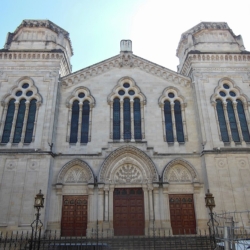| Source (Spanish) | Translation (English) |
|---|---|
Bendigamos al Altísimo, Al Señor que nos crió, Démosle agradecimiento Por los bienes que nos dió. |
Let us bless the Most High, The Señor/Lord who created us, Let us give thanks For the good things which he gave us. |
Alabado sea su Santo Nombre, Porque siempre nos apiadó. Load al Señor que es bueno, Que para siempre su merced. |
Praise his Holy Name, Because he always took pity on us. Praise the Lord for he is good; Let your mercy endure forever. |
Bendigamos al Altísimo, Por su Ley primeramente, Que liga a nuestra raza Con el cielo continuamente, |
Let us bless the Most High, First for his Torah, Binding our people With the heavens continuously, |
Alabado sea su Santo Nombre, Porque siempre nos apiadó. Load al Senor que es bueno, Que para siempre su merced. |
Praise his Holy Name, Because he always took pity on us. Praise the Lord for he is good; Let your mercy endure forever. |
Bendigamos al Altísimo, Por el pan segundamente, Y también por los manjares Que comimos juntamente. |
Let us bless the Most High, Secondly for the bread, And for the delicacies We ate together. |
Pues comimos y bebimos alegremente Su merced nunca nos faltó. Load al Señor que es bueno, Que para siempre su merced. |
As we ate and drank merrily His mercy never failed us. Praise the Lord for he is good; Let your mercy endure forever. |
Bendita sea la casa esta, El hogar de su presencia, Donde guardamos su fiesta, Con alegría y permanencia. |
Bless this house, Home to his presence, Where we keep his festival, With joy and permanence. |
Alabado sea su Santo Nombre, Porque siempre nos apiadó. Load al Señor que es bueno, Que para siempre su merced. |
Praise his Holy Name, Because he always took pity on us. Praise the Lord for he is good; Let your mercy endure forever. |
Bendigamos is a hymn sung after meals according to the custom of the Sepharadim, the Jews of the Iberian peninsula. It is similar in meaning to the Birkat Hamazon (blessing after meals). Bendigamos is said in addition to Birkat Hamazon, either immediately before or immediately after it. The text is in modern Spanish, not Ladino. The melody is one of the best known and loved Spanish and Portuguese melodies, used also for the Song of the Sea (in the Shabbat morning service) and sometimes in “Hallel” (on the first day of the Hebrew month and on festivals).
The song probably originated among the Spanish-speaking Jews of Bordeaux, a Hispanophone rather than Lusophone community. (David Lévi Alvarès’s version ‘Bénissons‘ is a free adaptation for Sukkot.)[1] Thanks to Aron Sterk for clarifying this point. From France the Bendigamos song was probably brought to the Dutch West-Indies (Curaçao) in the mid-nineteenth century and thence taken to New York and Amsterdam. Alternatively, the song may have originated with Sephardic Jews living in Spain, who then immigrated to Turkey, other locales in the Ottoman Empire, and the Netherlands. It may originally have been written as a secret way to say the Birkat HaMazon after practicing Judaism in Spain and Portugal was forbidden in the fifteenth century. (adapted from the wikipedia article, “Bendigamos”)
Translation from Spanish via Aharon Varady. (Shgiyot mi yavin, Ministarot Nakeni)
Vocal and Guitar: Rabbi Shuviel Ma’aravi
Mandola and back up vocals: Joshua Polak
Recorded by Ty Ford

Ma’aravi-Polak featuring (left to right) Joshua Polak, Esther Polak, and Rabbi Shuviel Ma’aravi. Mike Abramov in foreground.
Recording
Notes
| 1 | Thanks to Aron Sterk for clarifying this point. |
|---|

“Bendigamos al Altísimo, a Spanish song for the Birkat haMazon” is shared through the Open Siddur Project with a Creative Commons Attribution-ShareAlike 4.0 International copyleft license.









Thank you for this beautiful posting. What is the original name of the tune? Where can one get the notation for guitar?
And for the Psalm 19:13 quote.
Over on the Open Siddur Project discussion group on Facebook, I’ve asked Joshua if he might share the musical notation for this piece in the format that we support (ABC Notation).
When I listened to this beautiful prayer and said the words my Neshama was filled with long gone memories of my wonderful youth. Thank you.
Thank you from a Sefaradi in Fresno, CA. Beautiful. Brought tears to my eyes.
That’s a beautiful melody! I, too, would love to have notation for it. (I’ll check out ABC Notation — if it’s not standard Western clefs-lines-and-spaces, I might do it myself and contribute it.)
Thank you for this lovely recoding…
We sing it after supper every Friday and it fills us with warm thoughts….thank you!